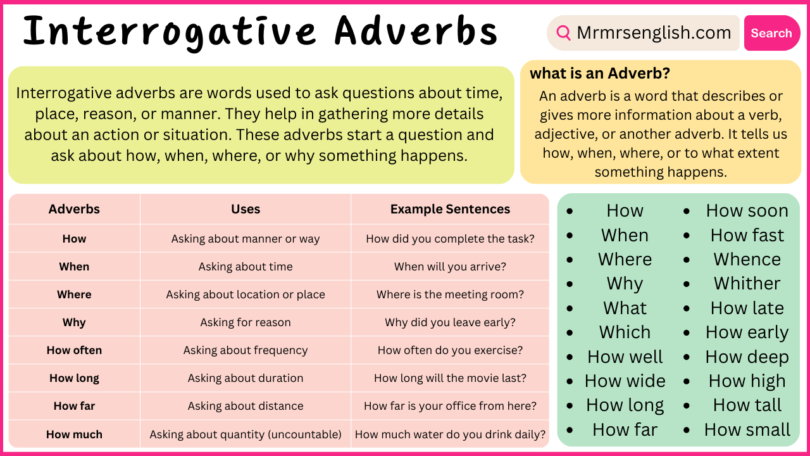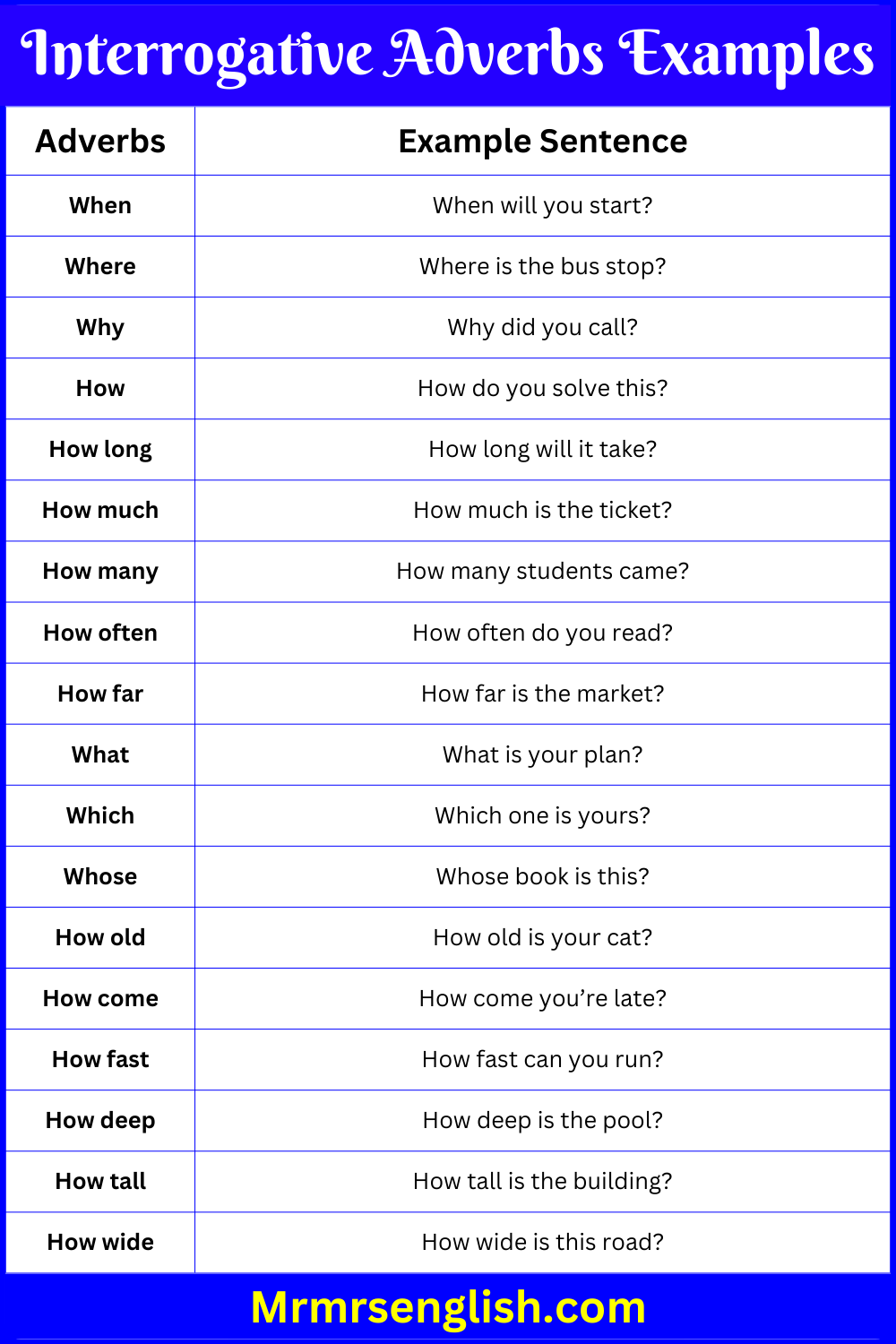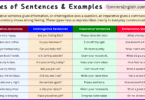Interrogative adverbs are special words we use when asking questions about time, place, reason, or manner. They help us find out more specific details in a conversation. For example, we ask questions like “When did you arrive?” or “Where is the school?” In this lesson, we will explore different types of interrogative adverbs and how to use them in sentences to ask the right questions. In this article, I have covered Interrogative Adverbs with definitions and example sentences…
What Are Interrogative Adverbs?
The words used to ask questions related to time, place, reason, or manner. These adverbs help gather information in a sentence by modifying the verb and providing clarity about the question being asked.
In simpler terms, interrogative adverbs answer questions like when, where, why, and how.
Types of Interrogative Adverbs
| Adverbs | Usage | Example Question |
|---|---|---|
| When | Refers to time | When will you arrive? |
| Where | Refers to place | Where did she go? |
| Why | Refers to reason or cause | Why are you late? |
| How | Refers to manner or condition | How did you solve the issue? |
Using Interrogative Adverbs in Sentences
These are usually placed at the beginning of a sentence to form a question. Each adverb serves a different function depending on what information the speaker is seeking. Below, we’ll look at each type in detail.
1. When – Asking About Time
is used to ask questions related to time. It seeks information about the timing of an action or event.
Example:
- When will the meeting start?
- When did you complete your homework?
In both examples, when is asking for the time of the actions (starting and completing).
2. Where – Asking About Place
is used to inquire about the location of an action or event. It seeks details on where something happens or is located.
Example:
- Where are you going?
- Where did you leave your keys?
Here, it asks for the location of the speaker’s actions (going and leaving).
3. Why – Asking About Reason
Why is an interrogative adverb that asks for the reason or cause behind an action. It is often used when the speaker wants an explanation.
Example:
- Why are you upset?
- Why did they cancel the event?
In these sentences, why is probing for the reason behind emotions or decisions.
4. How – Asking About Manner or Process
Here is used to ask about the way or manner in which something happens. It is also used to ask for details about a process or condition.
Example:
- How did you finish the project so quickly?
- How can I improve my English skills?
Difference Between Interrogative Adverbs and Interrogative Pronouns
A common point of confusion for learners is the difference between interrogative adverbs and interrogative pronouns. While both are used to ask questions, they serve different purposes.
| Interrogative Adverb | Interrogative Pronoun |
|---|---|
| Modifies a verb to ask about time, place, reason, or manner | Replaces a noun to ask about a person or thing, such as who or what |
| Example: When did you arrive? | Example: Who is your teacher? |
Advanced Usage of Interrogative Adverbs
In more complex sentence structures, it can be used in indirect questions, embedded questions, or combined with other parts of speech to form longer queries. Let’s look at some advanced examples.
Indirect Questions with Interrogative Adverbs
An indirect question is a question within a statement or another question. It does not require the typical question word order.
Example:
- Can you tell me why they are leaving?
- Do you know when the movie starts?
Interrogative Adverbs in Complex Sentences
You can also use them in more complex sentences to inquire about detailed information.
Example:
- How will you manage the project when you are so busy?
- Why didn’t you go where they told you to?
These examples show how it can be combined with conditional clauses or other adverbs to form longer, more detailed questions.
Common Mistakes with Interrogative Adverbs
It’s important to avoid common errors when using interrogative adverbs. Here are some frequent mistakes ESL learners make:
- Misplacing the Interrogative Adverb: The interrogative adverb must be placed at the start of a direct question.
- Incorrect: You went where?
- Correct: Where did you go?
- Using the Wrong Interrogative Adverb: Learners sometimes confuse the purpose of different adverbs.
- Incorrect: How did she leave? (asking about manner when the question is about time)
- Correct: When did she leave?
Interrogative Adverb Example Sentences
| Adverbs | Example Sentence |
|---|---|
| When | When will you visit us? |
| Where | Where is the nearest bank? |
| Why | Why are you so late? |
| How | How did you solve it? |
| When | When did she call you? |
| Where | Where did you park the car? |
| Why | Why is she crying? |
| How | How can I help you? |
| When | When will the train arrive? |
| Where | Where can I find him? |
| Why | Why didn’t you come? |
| How | How is your family doing? |
| When | When will we leave? |
| Where | Where did you buy that? |
| Why | Why are they arguing? |
| How | How do I fix this? |
| When | When can I see you again? |
| Where | Where did you go yesterday? |
| Why | Why didn’t you tell me? |
| How | How did you know that? |
- When
- Where
- Why
- How
- What
- Which
- Whom
- Whence
- Whereby
- Wherefore
- Whenever
- Wherever
- However
- Why not
- How often
- How long
- How much
- How far
- How many
- Why ever











Leave a Comment